League Of Olympic Swim Legends: Yana Klochkova Tops 400IM Podium With De Varona and Caulkins
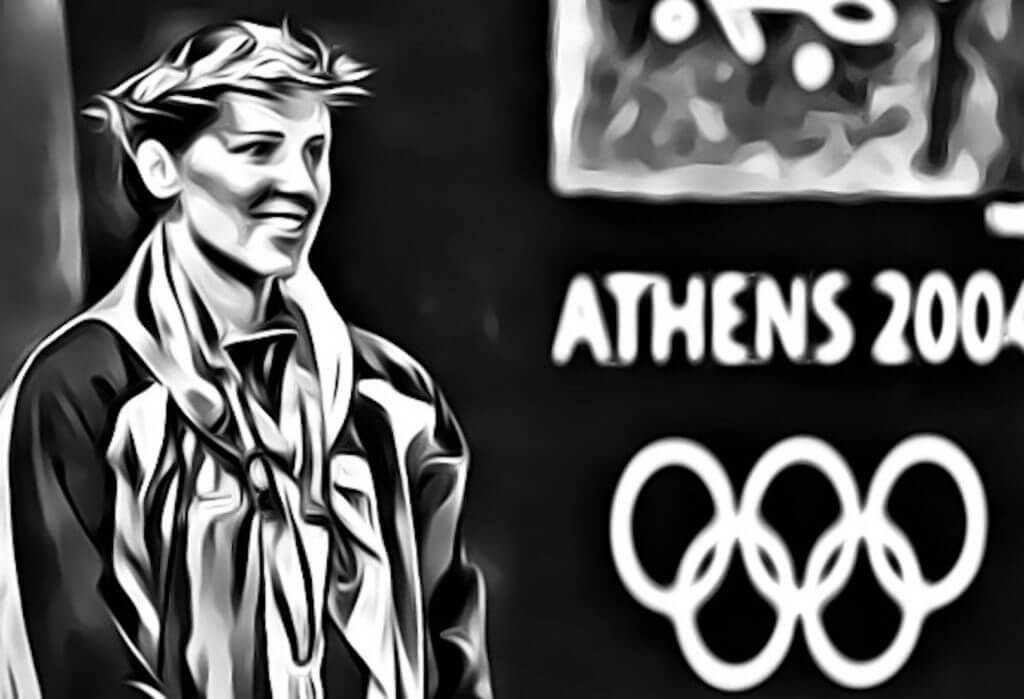
What would have unfolded had Tokyo 2020 gone ahead as planned this week – and where would it all have fit in the thread of Olympic swim legends like Yana Klochkova, Donna De Varona and Tracy Caulkins…?
To mark the eight days over which the Tokyo 2020 Olympic Games would have unfolded had the coronavirus pandemic not forced postponement, the team at Swimming World is filling the void with a Virtual Vision Form Guide and League of Olympic Swimming Legends.
Tokyo Vision: Katinka Hosszu Hoping to Stand Alongside Yana Klochkova With 400 IM Defense
Day 1, event 3 … a double-double from
Women’s 400m medley
Yana Klochkova of Ukraine – double medley Olympic Champion in both 2000 and 2004 – Photo Courtesy: ISHOF
The Podium
- Yana Klochkova (UKR)
- Donna De Varona (USA)
- Tracy Caulkins (USA)
The Other Finalists (Listed Alphabetically):
- Krisztina Egerszegi (HUN)
- Katina Hosszu (HUN)
- Claudia Kolb (USA)
- Gail Neall (AUS)
- Stephanie Rice (AUS)
- and in Lane 9* to represent all those denied by the GDR’s State Plan 14:25 and the androgenisation it poured into women’s swimming for the best part of 20 years; a second name there, too, for another silver-lining in the storybook of winners who fell foul of anti-doping rules in their careers:
- Sharron Davies (GBR); Allison Wagner (USA)
* – in our series, we will use Lane 9 to add an athlete whose story reflects extraordinary situations of different kinds
All-Time Battle Of Olympic Swim Legends Goes To Yana Klochkova
In two different fashions, the Ukraine’s Yana Klochkova ascended to the top of an Olympic podium in the 400 individual medley. In 2000, she climbed to the highest step behind a world-record performance and a victory margin of more than two seconds. Four years later, Klochkova retained her throne with a narrow decision. As the only two-time champion in the event, Klochkova also wears a Legends gold medal.
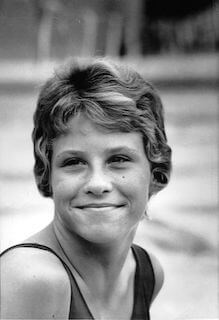
Donna de Varona – Photo Courtesy: Donna de Varona
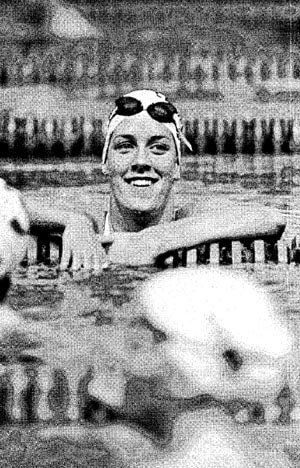
Tracy Caulkins. Photo Courtesy: Swimming World Magazine
Klochkova was exquisite during her peak years, excelling not only in the 400 medley, but also dominant in the 200 medley and among the world’s elite in the distance-freestyle events. En route to this Legends title, the Ukrainian edged American Donna De Varona, the 1964 Olympic champion who set six world records, the first at 5:36.5 and the last at 5:14.9. Her Olympic title, meanwhile, was won by five-plus seconds over countrywoman Sharon Finneran, with whom De Varona once exchanged the world record.
The fight for the bronze medal came down to the United States’ Tracy Caulkins and Australia’s Stephanie Rice, with Caulkins gaining the podium spot. Had Caulkins not been penalized by the 1980 American boycott of the 1980 Games, she very well could be higher on the medals stand. More, she likely would have had more than one world record had the East German government not overseen a systematic-doping program. The reality delivered by the guardians of swimming, however, left Caulkins with the one gold, in 1984, and behind Yana Klochkova and Donna De Varona in our legends race.
By the time Caulkins rose top her blocks at Los Angeles 1984, she had set more than 60 U.S. records, won 48 U.S. titles, back then 12 more than anyone ever had before her. She just needed Olympic gold – and that she got, with an advantage over the rest of 15m.
It was July 29, 1984, four years beyond what might have been a soaring Olympic debut for Caulkins. In the heats in Los Angeles, Caulkins cruised through in 4:44.42. In the final, she dominated the race from start to finish, turning in 1:03.63, 2:13.91 and 3:34.81 on her way to an American record of 4:39.24.
If the GDR era was most noticeable for the harm done to the likes of Shirley Babashoff, her 1976 USA teammates, Enith Brigitha (NED), Nancy Garapick (CAN) and Americans Sippy Woodhead, Mary T. Meagher and Caulkins, among others, the years of State Plan 14:25 took a toll of European women swimmers at every level, global and continental.
As we will see tomorrow in our last crop of Memories of Moscow 1980 to mark the final day of racing 40 years ago on July 27, the lives of women’s including the girls of the GDR, were altered forever, one way or another. We cannot recognise in this series every woman who ever finished 4th, 5th and 6th behind a name from the GDR (nor was the GDR the only nation not playing by the rules) but we can recognise representatives of all those women from the list of those who might have boasted an Olympic title had the World been a fairer place and had guardians fought harder to deliver clean sport and send a no-tolerance message to those determined to cheat, at any price, as state-police (Stasi) archives show, beyond a shadow of a doubt.
In that spirit, candidates for Lane 9 include Sharron Davies, of Britain, and Cheryl Gibson, of Canada, both silver medallists behind East Germans in Olympic 400IM finals, and American Allison Wagner, who who piped defending champion of 1992 Krisztina Egerszegi in the 1996 final only to find Michelle Smith, of Ireland, had finished 3sec ahead of her on the way to a tampering case that would lead to a suspension from the sport.
In our Legends battle, the 2008 Olympic champion, Rice pushed Caulkins to the finish and benefited from setting two world records during the 2008 season, a campaign known for the use of non-textile suits. Her Olympic title was nonetheless impressive in nature, a world record of 4:29.45 needed to fend off Zimbabwe’s Kirsty Coventry, who also went under the existing world record.
Olympic Swim Legends – Our Winner’s Winning Ways:
Yana Klochkova’s First Olympic Gold – In World-Record Time
2000 Sydney – Women 400m Medley – Athletes: 28 Nations: 24
- 4:33.59wr Yana Klochkova UKR
- 4:35.96 Yasuko Tajima JPN
- 4:37.18 Beatrice Coada-Caslaru ROM
4:41.03 Kaitlin Sandeno USA
4:43.56 Nicole Hetzer GER
4:44.63 Madeleine Crippen USA
4:45.17 Joanne Malar CAN
4:45.99 Jennifer Reilly AUS
Date of final: September 16, 2000
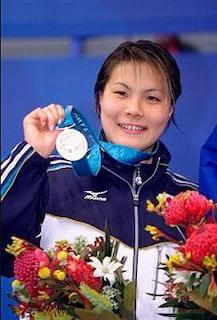
Yasuko Ttajima
Yana Klochkova (UKR) led from start to finish, via splits of 1:01.62, 2;11.30 and 3:30.63 on her way to a world record of 4:33.59. Also inside the previous Olympic record was Yasuko Tajima (JPN) on 4:35.96, while Beatrice Coada-Caslaru (ROM) took bronze. The previous world record holder Chen Yan (CHN) did not make the final, racing a 4:45.65 in heats.
Between Games, Klochkova claimed the 2001 and 2003 World titles over 400m and earned silver over 200m in 2001 and the title in 2003. The 2004 Olympic 400m final would turn out to be a bruising battle.
The race made Yana Klochkova the first woman ever to retain an Olympic medley crown of any distance. The race was tougher than she had imagined it would be, courtesy of the American who had finished fourth four years earlier, Kaitlin Sandeno.
Klochkova took the race out hard in her usual manner but found herself second turning into backstroke, her 1:02.03 split a touch behind a 1:01.91 for Eva Risztov (HUN), who had finished second just half a second behind Klochkova at the 2003 World Championships. In third was Sandeno, on 1:02.95. The champion edged ahead on backstroke, turning in 2:12.03, 0.2sec up on the Hungarian, with the American on 2:13.30. Risztov fell off the pace on breaststroke, while Sandeno drew level with Klochkova, the Ukrainian retaining a tiny edge going into freestyle, on 3:33.00 to 3:33.09.
Both women had solid world-class middle-distance freestyle times to their names. The decision came down to the last five metres and timing into the wall. By just 0.12sec, Klochkova was champion once more, Sandeno the American record holder and Georgina Bardach (ARG) racing past rivals to become the first Argentinian to make the Olympic podium since Jeanette Campbell, born of Scottish parents, had earned silver in the 1936 100m freestyle final.
Between Games – Klochkova’s First 400IM World Title
Another Great 400m Medley Race In History
When Claudia Kolb Clobbered the field with the biggest winning margin in history
1968 Mexico City – Women 400m Individual Medley: Athletes: 28 Nations: 19
- 5:08.5 Claudia Kolb USA
- 5:22.2 Lynn Vidali USA
- 5:25.3 Sabine Steinbach GDR
5:25.8 Susan Pedersen USA
5:30.5 Shelagh Ratcliffe GBR
5:32.0 Marianne Seydel GDR
5:34.6 Tui Shipston NZL
5:35.7 Laura Vaca MEX
Date of final: October 25, 1968
Claudia Kolb’s victories over 200 and 400m medley at high altitude in Mexico in 1968 remain two of the most decisive Olympic triumphs in swimming history. The first holder of the world record over 200m medley, Kolb, who at 14 at the 1964 Games won a surprise silver in the 200m breaststroke, clocked 2:24.7 over that distance to win by 4.1sec in Mexico. Over 400m, the gap from Kolb to teammate Lynn Vidali, silver medal winner, was 13.7sec: where Kolb clocked 5:08.5, half the final could not manage to break 5:30.
Five days after winning the 200m medley, Kolb clobbered her opponents by swimming a generation before her time on the way to an Olympic record of 5:08.5 over 400m, an effort that suggested she had a much faster time in her take away the effects of altitude. Her splits were: 1:08.2; 2:27.9; 3:57.9 and 5:08.5. Vidali would win bronze in the 200m four years on in Munich.
Kolb, then 18, led a USA Sweep in the 200m medley in Mexico, on 2:24.7 ahead of Sue Pedersen, 2:28.8, and Jan Henne, 2:31.4. The champion emerged from victory to say:
“My breaststroke helps me pick up the most. It’s my best medley stroke. I’m not surprised at the time, after Colorado I thought I might go a 25. We talked about the other girls weaknesses and strong points, because we wanted to make it 1-2-3 for the U.S.”
Born in Haywood, California, Kolb set nine medley world records, five over 200 and four over 400m, between 1966 and 1968, leaving the standards at 2:23.5 and 5:04.1. Four years later, when Australians Shane Gould and Gail Neall won the Olympic 200 and 400m medley titles, respectively, and became the first (and the only, until Stephanie Rice in 2008) Australians to achieve those accolades, they did so in world record times that bettered Kolb by only 0.43 and 1.73sec.
Kolb was a terrific all-rounder: at the 1967 Pan American Games in Winnipeg, Kolb won the 200m butterfly, was second over 200m breaststroke and set world records in both medleys.
Kolb retired from competition after the Games in Mexico and went on to coach swimming at South Bend, Indiana, and Santa Clara, California, at Stanford University and at the Pacific University. Her Stanford swimmers won the 1980 NCAA (US colleges) team championship.
Of late, she could be found signing the Team Integrity letter to have U.S. Congress pass S2330 Athlete Empowerment legislation designed to protect athletes from rogues and the abuse suffered by many women athletes down many a long decade.
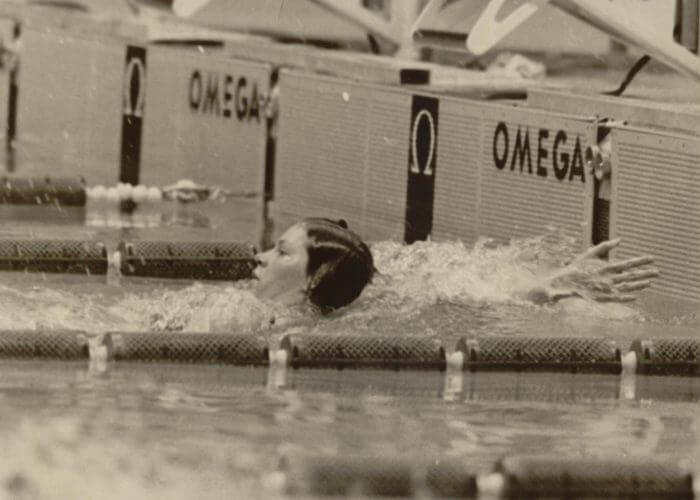
Photo Courtesy: Swimming World Archive




Nice to read this, enjoyable.
I realize that this is all conjecture, but I truly believe Caulkins never reached her potential for the 400 IM.
She had PBs of 59plus for the 100 fly, 1:03plus for the 100 bCK, 1:09plus for the 100 breast and :56plus for the 100 free….and this was waaaay back in the very very early 1980s. She and her coaches knew she was better than Schneider’s 4:36 but we will never know just how fast she could have been. The Los Angeles 4:39 was ok, but in Moscow, we could have MAYBE seen a 4:34/4:35. The evidence we have of this was in 1981 at the sc meters meet held in Gainesville. Against Schneider, ready for fast racing, she destroyed the then world best and clobbered Schneider swimming next to her. That race was nothing more than a teaser of what could have happened in Moscow. At her best, no one could beat Tracy. At that same meet, she defeated Geweniger in the 100 breast and Reinisch in the 100 back.
Yes, Sebastian – sadly, we can only imagine what might have happened. What we do know is that dosages were timed specifically ahead of majors, the Stasi archive of all of that, quite clear in the methodology being used… so, the big occasions would always be the most difficult moments for the women facing their GDR rivals, however well prepared for such singular moments they were. The rogues were not really bothered about the tours and trails on the way to what they wanted: for sport to reflect the ‘greatness’ of their political masters, who were actually the opposite of greatness, the criminality of all who sat round tables and agreed that State Plan 14:25 was the way to go abundantly clear.
Love seeing Gail Neall in this top 8!
Craig, you are 100% correct re the dosages given the DDR swimmers in the lead up to major competitions. But, sometimes, talent + hard work will defeat the drugs. Tracy’s talent and stroke were above anything Schneider could produce. The best example of this would be Janet Evans destroying Friedrich at Seoul. Everyone was extremely worried that Friedrich would hammer Janet, but…..well, we all know what happened. I believe if Tracy had been fully prepared and honed to the razor’s edge mentally and physically, she would have won. But……….damn the boycott.
You may well be right. As you say, damn the boycott